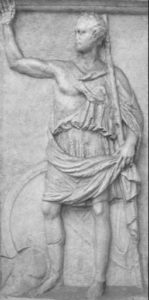
The Greek historian Polybius (c. 200 – c. 118 BCE) lived a bicultural life that straddled both the Greek and Roman worlds. Born into a leading family of the Achaean Confederacy, Polybius was the son of Lycortas, who with Philopoemen crafted a policy of equality with Rome. At the age of thirty (170/69 BCE) Polybius became hipparchus, the second highest office in the Achaean League. Yet after Perseus of Macedon was defeated by the Romans at the Battle of Pydna (168 BCE), Polybius was deported to Italy along with another thousand hostages. Soon after he arrived in Italy, he became friends with an eighteen year old Scipio Aemilianus “in the loan of some books and conversation about them” (31.23.4). Their relationship developed into friendship and Polybius accompanied Scipio to Spain and Carthage where he witnessed the sack of the North African city. After the sack of Corinth by Mummius in 146 BCE, he accompanied the Ten Commissioners to Achaea and helped serve as a mediator between the defeated Greek cities and the Romans (39.5.1-6). According to Pausanias, in gratitude for his intervention and advocacy, Polybius received honors in more than a half dozen cities across the Peloponnese.
In writing a universal history that encompassed both the western and eastern Mediterranean, Polybius was keen to explain the gradual ascendency of Rome over a brief fifty-three span from 220-167 BCE. His method was a search for the truth, discovering the causes and reasons (aitia; 3.31.12, 3.6.1, 22.18.8) for events and offering a pragmatic historiography (pragmatike historia) that offered readers standards and lessons for political action in the present day (12.25b). With access to archives, key figures on both sides, personal inspection of particular sites (autopsia), and firsthand knowledge of certain events, Polybius’ history is considered very reliable. Upon completing his history down to 167 (Books 3-20), Polybius added a second preface and wrote of the events leading to demise of the Achaean League and the sack of Corinth by Mummius in 146 BCE (Books 31-40). Unfortunately, only Books 1-5 are complete, and the subsequent books, including Book 18, are preserved in excerpts and quotations by other writers.
Walbank, F. W. A Historical Commentary on Polybius. 3 vols. Oxford: Clarendon Press, 1957, 1967, 1979.